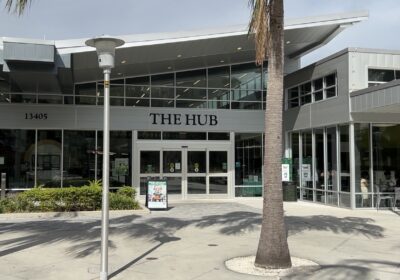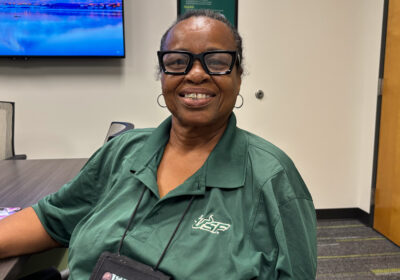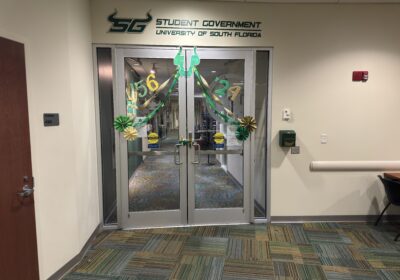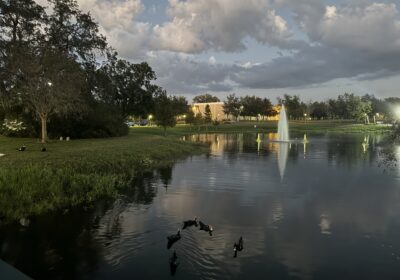USF complies to new bathroom rules mandated by state

A regulation requiring that USF students, staff and employees use facilities corresponding to their sex assigned at birth was added to the Student Code of Conduct.
Under the new rule, anyone can be charged with trespassing for using and refusing to leave the “wrong” facility on campus.
Regulation 6.0021 refers to the “Safety in Public Spaces Act,” or Senate Bill (SB) 1674, was approved at the Board of Trustees (BOT) meeting on March 18.
The trustees have until April 1 to submit documentation stating how they will comply with the Board of Governors (BOG) request.
The regulation was implemented in order to “maintain public safety, decency, decorum and privacy.” The document established that “females” are defined by having the “specific reproductive role producing eggs” and “males” as having the “specific reproductive role of producing sperm.”
Related: Trans students fear new USF bathroom rule: ‘Treated as a whole different species’
Why didn’t you hear about it?
The regulation was approved in the BOT meeting Consent Agenda, meaning it was previously discussed in the Academics and Campus Environment Advisory Council (ACEAC) or ACE committee, in February.
The committee is responsible for “student issues and policies.”
Consent agenda items are previously discussed in extent and then approved by the trustees by just vote, as a package, said USF spokesperson Althea Johnson.
“If an item falls under the Consent Agenda, the board typically does not discuss it,” she wrote.
Regulation 6.0021 was approved unanimously with no comments.
Jenifer Schneider, faculty senate president and member of the ACE committee, was not available for comment at the time of publication.
What are the consequences for using the “wrong” facility?
Non-USF related people can also be charged with trespassing if using the “wrong” changing facility or restroom.
Students who are found in the “wrong” facility may suffer disciplinary consequences within violation of the Student Code of Conduct. Legislation requires universities to establish those consequences.
USF employees will face “disciplinary actions” established in the BOG regulation.
“Disciplinary action” was not specifically defined in Regulation 6.0021.
If anyone – student, staff or campus visitor – refuses to leave after instructed to by an administrator, they will be charged with trespassing, according to the regulation.
“Gender-inclusive” and single-stall bathrooms are still available on campus.
How will “checking” be implemented?
In order to get someone to leave the bathroom or facility, someone else has to find a USF administrator and guide them back into the location, according to the regulation.
Andy Pham, treasurer for the Trans Student Union (TSU), said the only way complaints will be made is if people start “policing” other people’s bathroom usage.
Pham said this is a “logistical nightmare” for the university administration.
“You can’t see chromosomes when you see someone,” he said. “You can’t see the genitalia someone had at birth, it is logistically impossible to track the attributes the bill considers for this.”
Sophomore Kaitlyn Rodriguez, Student Government (SG) senate policy chair and a trans woman, said administration had “no common sense, period” when considering the implementation of such “policing.”
“It is extremely invasive,” she said. “I just don’t see it working like [USF] think it will.”
Rodriguez said she doesn’t “see” a student getting in trouble for using restrooms. The student can simply leave before being asked to by an administrator, she said.
Are gender-inclusive bathrooms enough?
In 2017, TSU and the Committee on Issues of Sexual Orientation and Gender Identity (GISOGI) created an interactive map of gender inclusive and single stall bathrooms at the Tampa campus.
Rodriguez said USF has to do a “better job” with accessibility of these restrooms. She said oftentimes she finds them to be dirty.
“I know no one wants to use either bathroom on campus because they are always disgusting anyway,” she said.
Pham said people still have the option of using the single stalls and there are a significant number of them on campus. There are 39 single-stall bathrooms on campus.
What is the impact on the queer USF community?
Danielle McDonald, dean of students, and Ian Carrol, assistant director of Student Conduct and Ethical Development, met with TSU and the Pride Alliance when drafting the regulations, according to Rodriguez.
“They had to use [student organizations] to relay the message, so it’s like ‘don’t get mad at the messenger guys,’” she said.
Pham said he feels that USF administrators did their best to accommodate trans and nonbinary students, while still complying to the state. Rodriguez was in agreement.
“USF is actually doing a good job on how they chose to go about it,” Rodriguez said. “It sucks that it had to happen, they are doing the best to their ability, in my opinion.”
Although the new regulation’s text says the new rule is to “maintain safety” for all in restrooms and changing facilities, Pham said he is concerned with how this change would “allow” people to act on their transphobic thoughts.
“We are all aware that [trans people] are much more likely to be assaulted or battered in a restroom,” Pham said. “I think in everyone’s mind is Nex Benedict.”
Benedict was a nonbinary 16-year-old in Oklahoma who was assaulted by a group of students for using the “wrong” bathroom and passed away the day after, on Feb. 8. The case was deemed as a suicide in the state courts, according to a March AP News article.
Pham said the TSU and the USF Pride Alliance are planning on providing queer students with information on how to proceed if ever asked to leave a restroom.
He said he still encourages students to use the bathroom they feel safest and most comfortable in.







